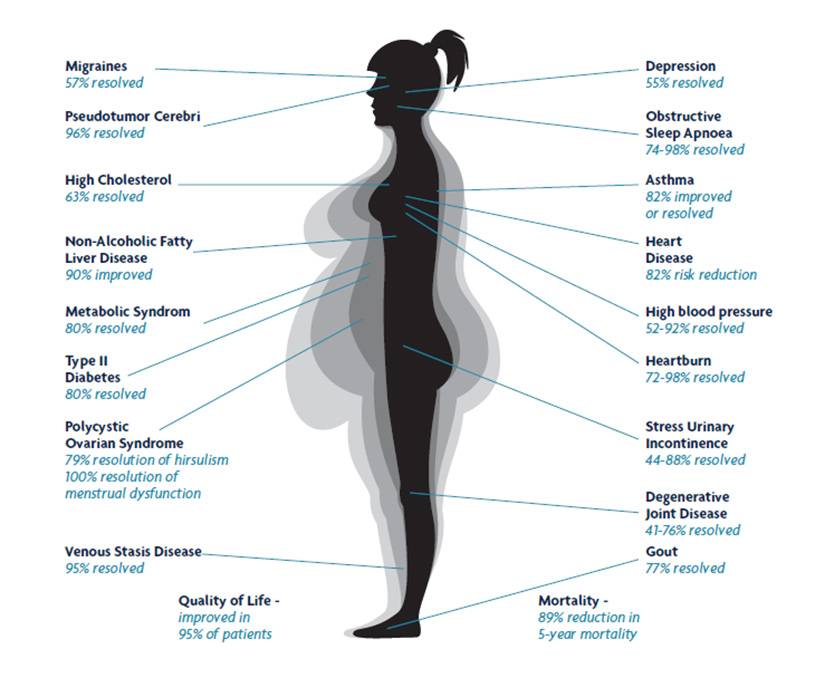
Treating Obesity Treats PCOS and Improves Fertility
People with obesity are more likely to have infertility, and they are less likely to benefit from fertility treatment. Obesity can also cause hormonal imbalances that impair ovulation, such as Polycystic Ovarian Syndrome or PCOS.
The good news for women is that PCOS responds well to weight loss.
And the good news for men is that getting down to a healthy weight at least 3 months before trying for a baby can improve both the chances of conception and the health of the baby.
When planning a family, you want to do everything you can to increase the chances of having a healthy baby with your partner. This means focusing on your health first, especially if you suffer from obesity.
Starting your pregnancy with obesity is associated with an increased risk of complications such as miscarriage, preeclampsia, gestational diabetes and stillbirth.
Getting weight back into the healthy range before conception reduces the risk of developing complications during pregnancy and reduces the risk of health problems for your baby.
Babies born to mothers of a healthy weight are less likely to develop obesity themselves as children and adults.
If you have obesity and are planning to have a baby in the next few years, you might want to act now to lose weight.
Am I A Candidate?
Find out whether weight loss surgery is the right path for you.
Treating Obesity Treats Stress Urinary Incontinence
Women who suffer from Stress Urinary incontinence experience symptoms with actions that raise the pressure within their abdomen, like sneezing or laughing.

It can be an embarrassing topic to discuss, but it’s important that we do. Many women suffer in silence because they do not want to undergo a pelvic floor operation.
Many women do not know that obesity is the most important risk factor for Stress Incontinence.
The extra weight carried around a person’s middle puts undue stress and pressure on to the pelvic floor muscles. The muscles get weak and sag. It can also damage the nerves that control the bladder.
The good news is – when their obesity is treated, up to nine out of ten suffers find their stress incontinence also resolves.
Am I A Candidate?
Find out whether weight loss surgery is the right path for you.
Treating Obesity Treats Arthritis
Osteoarthritis is the most common type of arthritis in Australia, affecting over 3 million Australians.

It turns out it’s not just the extra weight on joints that’s causing damage. Fat itself is active tissue that creates and releases inflammatory chemicals that over time can damage joints. Obesity makes arthritis worse. Once osteoarthritis takes hold, total joint replacement may become the only option.
The good news for sufferers is that when their obesity is treated, 3/4 find their osteoarthritis resolves.
If you’re struggling with obesity and osteoarthritis, start the conversation with your doctor today to obtain the most effective weight loss treatment available for a healthier, happier you.
Am I A Candidate?
Find out whether weight loss surgery is the right path for you.
Treating Obesity Treats Gout
Gout is a common form of arthritis in Australia. It occurs when uric acid abnormally crystallises in joints, causing inflammation and swelling.
Gout can affect any joint in the body and is extremely painful. Flares of gout limit your ability to function, increase your number of sick days from work, and reduce your independence.
The main risk factors for gout are alcohol consumption, dehydration, carrying excess weight or having obesity. Older men are particularly at risk. The good news is treating obesity treats gout by preventing attacks from occurring.
If you struggle with obesity and gout, start the conversation with your doctor today to obtain the most effective weight loss treatment available for a healthier, happier you.
Am I A Candidate?
Find out whether weight loss surgery is the right path for you.
Treating Obesity Can Prevent Cancer
Thirteen types of cancer have been strongly linked to carrying excess weight or obesity:

– Breast cancer (in women after menopause)
– Ovarian cancer
– Uterine cancer
– Thyroid cancer
– Brain tumour (meningioma)
– Blood cancer (multiple myeloma)
– Kidney cancer
– Stomach cancer
– Oesophageal cancer
– Liver cancer
– Gall bladder cancer
– Pancreatic cancer
Recently released 20-year findings from the landmark Swedish Obesity Study have shown bariatric surgery is associated with a reduction in the incidence of primary cancer diagnoses. It also reduces the risk of overall cancer, predominately for female specific cancer and particularly endometrial cancer.
If you have obesity and an increased risk of developing these cancers, start the conversation with your doctor today to obtain the most effective weight loss treatment available for a healthier, happier you.
Am I A Candidate?
Find out whether weight loss surgery is the right path for you.
Treating Obesity Treats Diabetes
For people suffering from Type 2 Diabetes and obesity, there is a treatment available which can put diabetes into remission. This means no more medications. The treatment is metabolic surgery, which puts diabetes into remission in 60 – 80% of cases.

For people with Type 2 diabetes and a BMI above 35, Australian guidelines recommend metabolic surgery be offered as the most effective treatment.
People with a BMI above 30 who are struggling to control their Type 2 diabetes and have an increased risk of heart disease should also be offered metabolic surgery.
If you suffer from obesity and diabetes, start the conversation with your doctor today to obtain the most effective weight loss treatment available for a healthier, happier you.
Am I A Candidate?
Find out whether weight loss surgery is the right path for you.
Treating Obesity Treats Sleep Apnoea
Every day, we see people in our practice who are tired. One serious cause of fatigue is obstructive sleep apnoea.
1 in 4 Australian men and 1 in 10 women suffer from sleep apnoea.
It’s caused by floppiness of the throat muscles during sleep that leads to interrupted breathing. People report snoring (and even choking) at night, as well as daytime sleepiness.
Left untreated, sleep apnoea can cause depression, stroke, high blood pressure, diabetes and heart disease. The good news is treating obesity treats sleep apnoea. When their obesity is treated, up to 98% of sufferers find their sleep apnoea also resolves.
If you struggle with obesity, fatigue, and sleep apnoea, start the conversation with your doctor today to obtain the most effective weight loss treatment available, for a healthier, happier you.
Am I A Candidate?
Find out whether weight loss surgery is the right path for you.
Treating Obesity Treats High Blood Pressure
Obesity leads to a number of other health issues, and a common one is high blood pressure. This occurs when your heart has to use greater force than normal to pump blood around your body. This can lead to very serious consequences. Persistent high blood pressure increases your risk of heart attacks, stroke, and kidney damage.
The good news is that treating obesity treats high blood pressure. When their obesity is treated, around 75% of sufferers find their blood pressure comes back into the healthy range. Other important treatments include exercise, medication, a healthy diet, and quitting smoking.
If you struggle with obesity and high blood pressure, start the conversation with your doctor today to obtain the most effective weight loss treatment available, for a healthier, happier you.
Am I A Candidate?
Find out whether weight loss surgery is the right path for you.
Treating Obesity Reduces Cardiovascular Risk
Heart disease kills one Australian every 12 minutes. The Heart Foundation considers obesity a major risk factor for heart disease and more than one in four Australians have obesity. The numbers seem overwhelming, but cannot be ignored.
Severe obesity is associated with high blood pressure, high cholesterol, irregular heartbeats and heart failure. People with severe obesity are at a higher risk of having a heart attack.
The good news is, if you have severe obesity, losing a large amount of weight reduces the risks associated with heart disease by a whopping 82%.
Treating obesity can almost halve your risk of a heart attack. Treating obesity improves the structure and function of your heart. Make your heart health a priority, for your sake and for your family’s sake.
Start the conversation with your doctor today about obtaining the most effective weight loss treatment available to help you eat less and move more for a healthier, happier you.
Am I A Candidate?
Find out whether weight loss surgery is the right path for you.
Treating Obesity Treats Depression
When it comes to obesity and depression, it’s a case of which came first – the chicken or the egg?
Depression is an important condition that is far more commonly found in Australians with obesity. People experiencing depression are more likely to overeat or make poor food choices, avoid exercising, and become more sedentary. Obesity can cause poor self-image, low self-esteem, and social isolation.
Psychological stress leads to hormonal and chemical patterns that cause weight gain, diabetes, heart disease, and sleep disturbance.
These conditions aggravate tiredness, lethargy and depression. When people seek treatment for depression, some of the most effective medications also increase hunger and weight gain.
So we have a picture of frustration and despair where people wrongly feel “it’s entirely my fault”.
The good news is treating obesity treats depression. When their obesity is treated, over half of sufferers find their depression also resolves.
If you struggle with obesity and depression, start the conversation with your doctor to obtain the most effective weight loss treatment available, for a healthier, happier you.
Am I A Candidate?
Find out whether weight loss surgery is the right path for you.
Treating Obesity Treats Fatty Liver Disease
Sometimes the health consequences of obesity are silent. But that doesn’t mean that they’re not serious.
Obesity can lead to a damaging accumulation of fat in the liver. Fatty liver disease is the most common cause of abnormal liver blood tests in Australia. Most people won’t have any symptoms, but if left untreated, fatty liver disease can lead to liver failure, diabetes, and heart disease.
The good news is fatty liver can be reversed. A healthy diet, avoidance of alcohol, weight loss, and regular exercise are all part of treatment. Even a small loss of weight can reduce the amount of fat around your liver and improve your health. When obesity is treated, over 90% of sufferers find their fatty liver improves.
If you struggle with obesity and fatty liver disease, start the conversation with your doctor today to obtain the most effective weight loss treatment available, for a healthier, happier you.
Am I A Candidate?
Find out whether weight loss surgery is the right path for you.
Treating Obesity Treats Heartburn and Reflux
If you get heartburn, you know the feeling well; a slight hiccup and then a burning sensation in your chest and throat. Heartburn, also referred to as GERD (gastroesophageal reflux disease),

occurs when stomach acid flows back into the oesophagus, the tube leading from the mouth to the stomach. As a person’s weight rises, so can their heartburn symptoms.
Having obesity raises the risk of GERD and two other conditions; erosive esophagitis and cancer of the oesophagus.
The good news is treating obesity treats heartburn and reflux. When their obesity is treated, up to 98% of sufferers find their heartburn also resolves.
If you struggle with obesity and heartburn, start the conversation with your doctor today to obtain the most effective weight loss treatment available, for a healthier, happier you.
Need Answers?
If you have any questions about our surgical weight loss options and would like them answered in person make sure you come along to our upcoming Patient Education Evening. You will be educated with the correct facts straight from Dr Jordaan, the Surgical Weight Loss Team and a patient who has undergone bariatric surgery.
Click here to register for our next Patient Education Evening